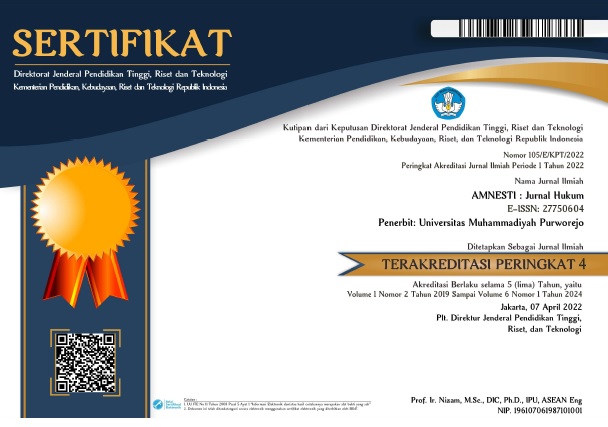Kebijakan Pemerintah terhadap Pengalihan Pengelolaan Lembaga Pemasyarakatan kepada Perusahaan Privat (Studi Kasus Negara Amerika Serikat)
Abstract
Amerika Serikat merupakan salah satu negara pencetus pengalihan pengelolaan lembaga Pemasyarakatan terhadap Perusahaan Privat. Hal tersebut dilatar belakangi oleh kesulitan untuk mengambil keputusan yang berdasarkan sistem rantai komando dan aliran sumber dana finansial yang berasal dari pajak himpunan masyarakat setempat. Oleh karena itu pihak Perusahaan Privat sebagai mitra swasta menjadi alternatif penyelesaian solusi karena setelah dipraktikkan memiliki tingkat keefektifan dan ketepatan di dalam mengatasi permasalahan yang terjadi baik secara internal maupun eksternal di Lembaga Pemasyarakatan. Penelitian ini bertujuan untuk menguraikan perbedaan sistem pengelolaan Lembaga Pemasyarakatan oleh Pemerintah dan Perusahaan Privat dengan menggunakan metode penelitian yuridis-normatif dan konseptual. Hasil penelitian menunjukkan bahwa Perusahaan Privat dapat mengambil keputusan krusial lebih cepat dan tepat serta tidak mengalami keterbatasan dana yang dapat menghambat perbaikan serta operasi fasilitas di lembaga seperti listrik, air, dan perbaikan infastruktur untuk meningkatkan kualitas hidup, keamanan, dan kenyamanan.
Downloads
References
Andreescu, R. (2017). Nobody gets out alive. This place just a big coffin": On Death and Dying in American Prisons. American, British and Canadian Studies, 29(1). https://doi.org/10.1515/abcsj-2017-0019
Appelbaum, K. L., Savageau, J. A., Trestman, R. L., Metzner, J. L., & Baillargeon, J. (2011). A national survey of self-injurious behavior in American prisons. Psychiatric Services, 62(3). https://doi.org/10.1176/ps.62.3.pss6203_0285
Benson, S. M. (2015). A political science of punishment: Francis lieber and the discipline of American prisons. New Political Science, 37(3). https://doi.org/10.1080/07393148.2015.1056432
Burkhardt, B. C. (2017). Who is in private prisons? Demographic profiles of prisoners and workers in American private prisons. International Journal of Law, Crime and Justice, 51. https://doi.org/10.1016/j.ijlcj.2017.04.004
Burkhardt, B. C., & Jones, A. (2016). Judicial Intervention into Prisons: Comparing Private and Public Prisons from 1990 to 2005. Justice System Journal, 37(1). https://doi.org/10.1080/0098261X.2015.1062738
Burneo-Garcés, C., & Pérez-García, M. (2018). Prevalence of psychopathological features in South American prisons using the personality assessment inventory. Behavioral Psychology/ Psicologia Conductual, 26(1).
de Leon Villalba, F. J. (2018). Imprisonment and Human Rights in Latin America: An Introduction. Prison Journal, 98(1). https://doi.org/10.1177/0032885517743442
Edwards, K. (2021). Prisoners’ perspectives on limited rehabilitative program opportunities. Qualitative Report, 26(4). https://doi.org/10.46743/2160-3715/2021.4495
Gaes, G. G. (2019). Current status of prison privatization research on American prisons and jails. Criminology and Public Policy, 18(2). https://doi.org/10.1111/1745-9133.12428
Gibson-Light, M. (2018). Ramen Politics: Informal Money and Logics of Resistance in the Contemporary American Prison. Qualitative Sociology, 41(2). https://doi.org/10.1007/s11133-018-9376-0
Hagan, J. L., & Hanson, A. (2016). The militarization of mass incapacitation and torture during the sunni insurgency and American occupation of Iraq. Social Sciences, 5(4). https://doi.org/10.3390/socsci5040078
Magsaysay, R. (2021). Asian Americans and Pacific Islanders and the Prison Industrial Complex. Michigan Journal of Race & Law, 26.2. https://doi.org/10.36643/mjrl.26.2.asian
Molina-Coloma, V., Salaberría, K., Pérez, J. I., & Kendall-Tackett, K. (2022). Traumatic Events, Psychological Symptoms, and Aggression in Male and Female Prisoners. Psychological Trauma: Theory, Research, Practice, and Policy, 14(3). https://doi.org/10.1037/tra0001039
Novisky, M. A., Narvey, C. S., & Semenza, D. C. (2020). Institutional Responses to the COVID-19 Pandemic in American Prisons. Victims and Offenders, 15(7–8). https://doi.org/10.1080/15564886.2020.1825582
Olson, J. C. (2016). Race and Punishment in American Prisons. Journal of Public Administration Research and Theory, 26(4). https://doi.org/10.1093/jopart/muw026
Peirce, J., & Fondevila, G. (2020). Concentrated Violence: The Influence of Criminal Activity and Governance on Prison Violence in Latin America. International Criminal Justice Review, 30(1). https://doi.org/10.1177/1057567719850235
Wade-Olson, J. (2019). Race, Staff, and Punishment: Representative Bureaucracy in American State Prisons. Administration and Society, 51(9). https://doi.org/10.1177/0095399716667156
Wildeman, C., Fitzpatrick, M. D., & Goldman, A. W. (2018). Conditions of confinement in American prisons and jails. In Annual Review of Law and Social Science (Vol. 14). https://doi.org/10.1146/annurev-lawsocsci-101317-031025
Wozniak, K. H. (2014). American Public Opinion About Prisons. Criminal Justice Review, 39(3). https://doi.org/10.1177/0734016814529968
Copyright (c) 2022 Amnesti: Jurnal Hukum

This work is licensed under a Creative Commons Attribution-NonCommercial 4.0 International License.






